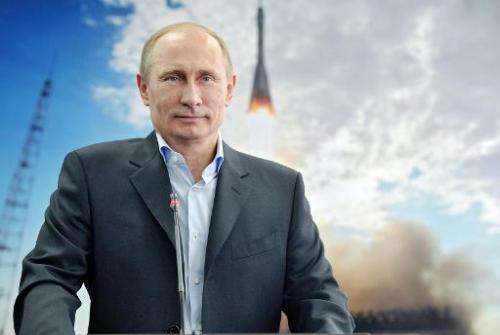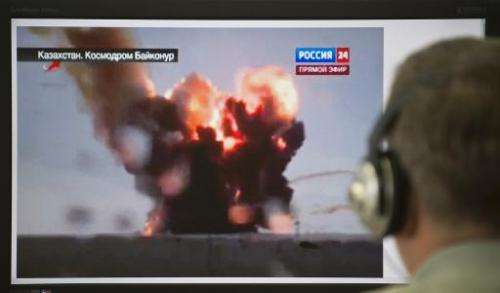Russia abruptly aborts launch of new-generation rocket (Update)

The test launch of Russia's newest rocket ended in embarrassment on Friday as authorities were forced to abort the flight overseen by President Vladimir Putin due to a last-minute glitch.
The mishap is the latest blow to the Russian government's plans to overhaul its famed space programme after a series of setbacks.
The next-generation Angara rocket was scheduled to blast off from Plesetsk in northern Russia when officials reported a sudden automatic launch abort, footage of which was broadcast on national television.
The Kremlin strongman, who was overseeing the rocket's planned launch via live linkup, gave space officials and the defence ministry an hour to look into the glitch before reporting to him.
"Work in a calm manner, without haste and fuss," he said in televised remarks.
The launch has been postponed until Saturday.
Designed to succeed Proton and other Soviet-era launchers, the Angara is billed as the first rocket to have been completely built after the collapse of the Soviet Union.
Officials say the next-generation spacecraft is more environmentally friendly than its predecessors because it is fuelled by oxygen and kerosene rather than hugely toxic heptyl.
The Khrunichev Center, the state-run spacecraft maker which developed the rocket, declined to say what went wrong.
"We can't say anything right now," a spokeswoman told AFP. "The defence ministry will be looking into this."
The Russian space programme is renowned for having sent the first man into space in 1961 and launching the first sputnik satellite four years earlier, and remains a major source of national pride.
But more recently, the programme has been hit by a number of setbacks, notably losing expensive satellites and an unmanned supply ship to the International Space Station.
Friday's mishap comes after a Proton launcher carrying an advanced communication satellite fell back to Earth minutes after lift-off in May.
Last July, an unmanned Proton carrier rocket exploded on takeoff at the Baikonur cosmodrome in Kazakhstan, releasing hundreds of tons of toxic fuel in spectacular images caught on live television.

'Billions of dollars'
Prime Minister Dmitry Medvedev has called the Angara a "strategically important" rocket that will rival the world's best spacecraft.
Its development was ordered by the then president Boris Yeltsin in the early 1990s and has cost "tens of billions of dollars", according to the Centre for Analysis of World Arms Trade.
It is crucial to the government's drive to reduce its dependence on the Baikonur launch pad Moscow leases from ex-Soviet Kazakhstan.
Officials and analysts downplayed the glitch on Friday, saying automatic launch aborts often occur during test flights.
"We have been waiting for this since 1993. We will wait another day," said independent space analyst Vadim Lukashevich.
"What's most important is that it has not exploded on takeoff," he told AFP.
Named after a Siberian river flowing out of Lake Baikal, the Angara family of rockets will come in light and heavy versions.
The heavy-class Angara rockets are designed with a view to launching manned spacecraft. The first such flight is scheduled to take place in 2018 from the Vostochny Cosmodrome, currently being built in Russia's Far East.
© 2014 AFP



















